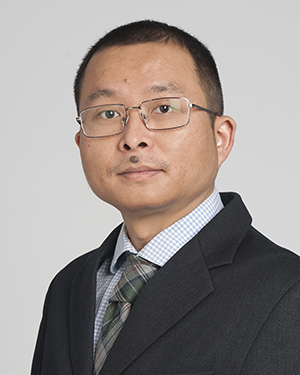Jianjun Wu Laboratory
-
Jianjun Wu Laboratory
- Principal Investigator
- Research
- Our Team
- Publications
- Careers
- Research News
Research
The Wu lab is interested in understanding the fundamental mechanism of innate immunity and its impact on adaptive immunity, inflammation and cancer. Dr. Wu’s lab is currently employing multifaceted approaches and mouse disease models to uncover the novel immunostimulatory or immunosuppressive mechanisms of cGAS-STING pathway in antitumor immunity and autoimmunity. The knowledge gained from these studies will be applied to guide the development of new immunotherapies for cancer and inflammatory diseases.
Biography
Dr. Jianjun Wu, appointed to the Center for Immunotherapy and Precision Immuno-Oncology (CITI) in 2021, is an investigator studying to gain key molecular insights into innate immune response to cancer. The overarching goal of the Wu lab is to harness innate immunity to reprogram the tumor microenvironment (TME) for the development of advanced cancer immunotherapies.
Dr. Wu earned his PhD in Molecular Biology from Wuhan University, and went on to complete two postdoctoral fellowships in the Department of Biological Science and the Department of Immunology at Florida State University and UT Southwestern Medical Center, respectively. Dr. Wu has also been featured in high impact journals such as Nature, Immunity, and Cell Host & Microbe, among others.
Education & Professional Highlights
Appointed
2021
Education & Fellowships
Postdoctoral Fellowship - UT Southwestern Medical Center
Immunology
Dallas, TX USA
2018
Postdoctoral Fellowship - Florida State University
Virology & Immunology
Tallahassee, FL USA
2016
Graduate - Wuhan University
Molecular Biology
Wuhan, Hubei, China
2012
Undergraduate - Hubei University
Biotechnology
Wuhan, Hubei, China
2006
Awards & Honors
- VeloSano Pilot Award, Cleveland Clinic
- American Association of Immunologists Trainee Abstract Award
- American Assocation of Immunologists Trainee Poster Award
- Outstanding Youth Paper Award, Chinese Society for Cell Biology
- Postgraduate Academic Innovation Award, Wuhan University
"CIMER Trained Mentor" indicates the principal investigator has completed mentorship training based on curriculum from the Center for the Improvement of Mentored Experiences in Research, aimed at advancing mentoring relationships and promoting cultural change in research.
Research
Our research focuses on understanding the fundamental mechanism of innate immunity and its impact on adaptive immunity, inflammation and cancer. Innate immune system mainly relies on pattern recognition receptors (PRRs) to detect invading pathogens and to mount robust anti-microbial immune responses. However, under certain circumstances, PRRs can be self-activated under sterile condition, leading to activation of adaptive immunity and thus triggering either protective immunity or immune disorders in different contexts. The main goal of the lab is to understand the molecular mechanism of innate immune control of adaptive immunity in cancer and inflammation. We aim to: 1) Study the molecular regulation of innate immunity in tumor microenvironment (TME), with the goal of harnessing innate immunity to improve cancer immunotherapy; 2) Understand how innate immunity is initiated in inflammatory environment, and its impact on inflammation and immune disorders.
Our Team
Selected Publications
Wu, J., Dobbs, N., Yang, K., and Yan, N. (2020). Interferon-Independent Activities of Mammalian STING Mediate Antiviral Response and Tumor Immune Evasion. Immunity 53, 115-126 e115.
Pokatayev, V., Yang, K., Tu, X., Dobbs, N., Wu, J., Kalb, R.G., and Yan, N. (2020). Homeostatic regulation of STING protein at the resting state by stabilizer TOLLIP. Nat Immunol 21, 158-167.
Wu, J., Chen, Y.J., Dobbs, N., Sakai, T., Liou, J., Miner, J.J., and Yan, N. (2019). STING-mediated disruption of calcium homeostasis chronically activates ER stress and primes T cell death. J Exp Med 216, 867-883.
Wu, J., and Yan, N. (2019). STIM1 moonlights as an anchor for STING. Nat Immunol 20, 112-114.
Warner, J.D., Irizarry-Caro, R.A., Bennion, B.G., Ai, T.L., Smith, A.M., Miner, C.A., Sakai, T., Gonugunta, V.K., Wu, J., Platt, D.J., et al. (2017). STING-associated vasculopathy develops independently of IRF3 in mice. J Exp Med 214, 3279-3292.
Gonugunta, V.K., Sakai, T., Pokatayev, V., Yang, K., Wu, J., Dobbs, N., and Yan, N. (2017). Trafficking-Mediated STING Degradation Requires Sorting to Acidified Endolysosomes and Can Be Targeted to Enhance Anti-tumor Response. Cell Rep 21, 3234-3242.
Li, W., Avey, D., Fu, B., Wu, J., Ma, S., Liu, X., and Zhu, F. (2016). Kaposi's Sarcoma-Associated Herpesvirus Inhibitor of cGAS (KicGAS), Encoded by ORF52, Is an Abundant Tegument Protein and Is Required for Production of Infectious Progeny Viruses. J Virol 90, 5329-5342.
Wu, J., Li, W., Shao, Y., Avey, D., Fu, B., Gillen, J., Hand, T., Ma, S., Liu, X., Miley, W., et al. (2015). Inhibition of cGAS DNA Sensing by a Herpesvirus Virion Protein. Cell Host Microbe 18, 333-344.
Wu, J., Avey, D., Li, W., Gillen, J., Fu, B., Miley, W., Whitby, D., and Zhu, F. (2015). ORF33 and ORF38 of Kaposi's Sarcoma-Associated Herpesvirus Interact and Are Required for Optimal Production of Infectious Progeny Viruses. J Virol 90, 1741-1756.
Gillen, J., Li, W., Liang, Q., Avey, D., Wu, J., Wu, F., Myoung, J., and Zhu, F. (2015). A survey of the interactome of Kaposi's sarcoma-associated herpesvirus ORF45 revealed its binding to viral ORF33 and cellular USP7, resulting in stabilization of ORF33 that is required for production of progeny viruses. J Virol 89, 4918-4931.
Careers
Training at Lerner Research Institute
Our education and training programs offer hands-on experience at one of the nationʼs top hospitals. Travel, publish in high impact journals and collaborate with investigators to solve real-world biomedical research questions.
Learn MoreResearch News

Dr. Wu tapped into Cleveland Clinic’s network of immune research experts to help land a competitive National Institutes of Health Merit Award.

Activating the protein STING increases tumor-fighting T cells in preclinical studies but may also increase production of T-cell dampeners.
